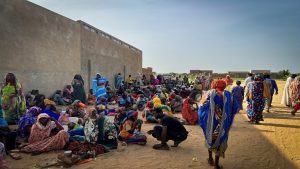The world is facing a highly disruptive moment in history and seismic shifts in technology and climate change could trigger a new divergence in society not seen since the Industrial Revolution.
That was among the key messages revealed in the latest United Nations (UN) HUMAN Development Report that focuses on a new generation of inequalities that have brought peoples onto the streets en-masse in different parts of the globe.
The Report titled Beyond Income, Beyond Averages, Beyond Today – Inequalities in human development in the 21st Century is being billed as a tool to inform public debate and empower discussion among key local, national and international policymakers.
As social unrest sweeps the globe – from Hong Kong in Asia, Lebanon and Iran in the Middle East, France, and the UK in Europe to the discontent in Sudan and Zimbabwe and other parts of Africa to Chile and Venezuela in South America, the 350-report argues that inequality is a common thread and could be a blueprint on how to tackle development in the 21st Century.
UN’s Development Programme Administrator Achim Steiner says, “We seem to be confronted with an increasing sense of discontent, of frustration that manifests itself in some of the political extremes that are emerging in national political debates, in the national political landscapes, but also with increasingly violent reactions that we have witnessed and these responses or reactions on the streets so to speak have a lot to do with development outcome and development choices of the past.”
Steiner and the authors of this report argue that this is not a story of development failures; quite the contrary in that development has delivered success stories including bringing millions of people out of dire poverty. But they also point to what we are witnessing right now and make the case that policy responses that are being developed are simply no longer adequate or acceptable to large numbers of people who no longer perceive them to deliver fair outcomes in the 21st Century.
“We still have the challenge of the extremely poor but on the back of many successful policies in reducing extreme poverty, what we are seeing is an opening up of a new generation of inequalities… and those interesting enough are particularly centered around the emerging middle-classes of societies, and therefore also manifest themselves through a more vocal set of protests and responses that have emanated from them.”
The report points out that a new generation of inequalities is opening up around education, around technology and climate change that if left unchecked could trigger a great split in societies everywhere.
Pedro Cenceicao is the lead author of the report.
“Inequalities in all dimensions of human development are still high. Inequalities are high and widespread and one example is if we look at what happened to a child born in the year 2000 in a low human development country compared to a child born in a very high development country. In the LHDC there’s a 17% probability that the child is not alive today 20 years after she was born, while in a very HHDC there is only 1% chance that this child is not alive today and more than half of the children born in the years 2000 in a HHDC are in higher education today while only 3% in a LHDC are in higher education today. So inequalities in human development remain high and widespread.”
The report analyses inequality in three steps – beyond income, beyond averages and beyond today and as Achim Steiner explains, inequalities of the 20th Century are giving way to a new generation of inequalities in the 21st Century.
“Understanding inequality and also framing responses to that phenomenon at local, national and international level – because in all three we are challenged – requires us to think beyond income. Its not the economy anymore stupid it is much more complex and it may have been in the 1980s but it certainly will not answer to the phenomena we are witnessing every night on our television screen and we can read in newspapers about what is happening and how people are reacting. It’s also beyond averages because averages do not captures the distribution reality.”
With a recognition that averages like per capita income and per capita GDP growth for a country often don’t provide a full picture of society’s development as the principle of fairness becomes key. European countries dominate the top ten of the Inequality-adjusted Human Development Index with Norway, Switzerland and Ireland making up the top three. South Africa is at 113th out of 189 countries listed.
Click on the audio below:






